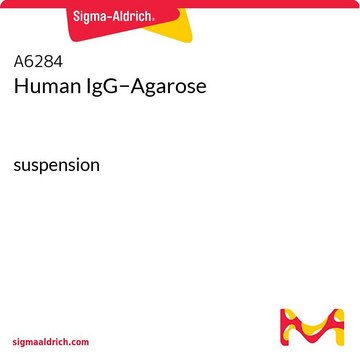A3543
Anti-Human IgG (whole molecule)−Agarose antibody produced in goat
IgG fraction of antiserum, PBS suspension
About This Item
Empfohlene Produkte
Biologische Quelle
goat
Konjugat
agarose conjugate
Antikörperform
IgG fraction of antiserum
Antikörper-Produkttyp
secondary antibodies
Klon
polyclonal
Form
PBS suspension
Speziesreaktivität
human
Kennzeichnungsgrad
~2.4 mg Ab per mL
Methode(n)
immunoelectrophoresis: suitable
Kapazität
1 mg/mL binding capacity
Lagertemp.
2-8°C
Posttranslationale Modifikation Target
unmodified
Allgemeine Beschreibung
Spezifität
Immunogen
Anwendung
Biochem./physiol. Wirkung
Physikalische Form
Haftungsausschluss
Sie haben nicht das passende Produkt gefunden?
Probieren Sie unser Produkt-Auswahlhilfe. aus.
Lagerklassenschlüssel
10 - Combustible liquids
WGK
nwg
Flammpunkt (°F)
Not applicable
Flammpunkt (°C)
Not applicable
Analysenzertifikate (COA)
Suchen Sie nach Analysenzertifikate (COA), indem Sie die Lot-/Chargennummer des Produkts eingeben. Lot- und Chargennummern sind auf dem Produktetikett hinter den Wörtern ‘Lot’ oder ‘Batch’ (Lot oder Charge) zu finden.
Besitzen Sie dieses Produkt bereits?
In der Dokumentenbibliothek finden Sie die Dokumentation zu den Produkten, die Sie kürzlich erworben haben.
Unser Team von Wissenschaftlern verfügt über Erfahrung in allen Forschungsbereichen einschließlich Life Science, Materialwissenschaften, chemischer Synthese, Chromatographie, Analytik und vielen mehr..
Setzen Sie sich mit dem technischen Dienst in Verbindung.




